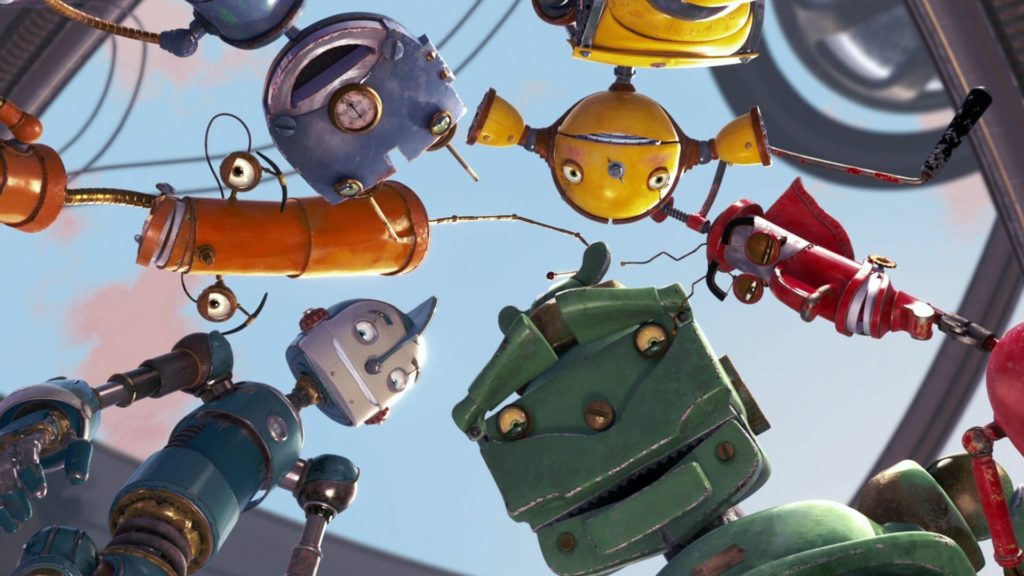San Junipero: Queer Heaven on Earth
Battles will come and go and queer people do die for their identity and fights for rights, but that doesn’t mean the gays don’t deserve their happy endings in stories.
Incluvie Foundation Gala - Learn More


Perhaps an inherent consequence of sentience, human beings have an urge to apply their lived experiences to other experiences they witness or fantasize about. In that context, it’s understandable, albeit confusing, why robots throughout fiction have been gendered beings. If they have to be gendered though, I hope future writers follow the blueprint Blue Sky’s Robots!
Robots tells the story of Rodney Copperbottom who joins Bigweld Industries as an innovator. Copperbottom has grown up with stories of Mr. Bigweld, a renowned entrepreneur who advocates for better living conditions for the underprivileged by not gatekeeping new innovations from them. However, Rodney is confronted with a harsh reality, learning that a new man called Ratchet has taken over in place of Bigweld. Ratchet keeps introducing upgrades and is treating older robots without newer parts like they’re scrap metal, melting them to make more upgrade parts which he then sells at exorbitant prices. This capitalist nightmare doesn’t stop Rodney though, and with the help of Fender, his first acquaintance in town, and his friends, he sets out repairing robots so they don’t get melted. This fight leads him to a disillusioned Bigweld, who he ends up inspiring. Finally, with the help of Bigweld, and his new group of friends, Rodney leads the revolution which results in Ratchet being overthrown.
On the face of it, Robots is an anti-capitalist comedy. But delve a little deeper, and you’ll realize it deconstructs gender. The most obvious reference to a transgender existence is the story of Fender, who when trying to escape from being melted, replaces his lost lower body part with a piece which turns out to be originally intended for a female robot. Fender literally goes through a sex change operation so to speak! A fun bit of trivia for the film nerds reading this, he was voiced by none other than Mrs. Doubtfire himself, Robin Williams. So, in the universe of Robots where parts are detachable and not romanticized, bodies are endlessly modifiable.
I can’t help but wonder how liberating it would be to have such an existence if you suffer from body dysmorphia. You could keep replacing your parts with others to build for yourself the ideal body. This would be a dream benefit for cisgender and transgender people alike. Fender and the other robots live in such a dream world! I wouldn’t go so far as to diagnose him with body dysmorphia, but even though he was confident in his male form, he’s more flamboyant and noticeably less clumsy in his female form. There’s a fight sequence where Fender dances to Britney Spears’ “…Baby One More Time” and takes out a bunch of Ratchet’s minions. I dare you to find me a more queer moment than a fight set to Britney, effectively a moment of awakening and coming out. There are also more subtle elements of the allegory beginning with Rodney himself. When he was a kid, his parents used to get him newer parts on his birthday to suit his age, and they were all hand-me-downs from his cousin/sister because they had a similar build and new parts were too expensive to afford. Robots challenges gender norms right from the get-go.

Robots is also a very good exploration of how body standards contribute to ostracism. Ratchet’s mission to outcast everyone who doesn’t buy his upgrades works as an allegory to social media bullying and rejection of people who do not live up to the unrealistic body standards of a society. “You can shine no matter what you’re made of,” Bigweld keeps repeating in the film, and I can’t think of a better positive message for anyone who has been ostracized for being different. Rodney’s war against the establishment is a war for preservation. A preservation of self. With the upgrades, everyone looks the same, so this battle could be interpreted as a fight against erasure of the self. Erasure is something most queer people know very well and experience in multiple forms in their lifetime. From being misgendered to having your identity denied, erasure is one of the most common forms of repression that the LGBTQIA+ community faces. The fight for queer rights is often just about the right of a queer person to live as their authentic self, instead of being forced to fit into the moulds created and perpetrated by the cisheteronormative world.
Related lists created by the same author
Battles will come and go and queer people do die for their identity and fights for rights, but that doesn’t mean the gays don’t deserve their happy endings in stories.
Related diversity category
Portraying how easy it is to be an ally heavily benefits the majority audience. The more we encourage it, normalize it, and give people the tools to become one, the sooner we can co-exist peacefully.
Related movie/TV/List/Topic
As a horror buff, I was intrigued by people claiming 'The Sadness' was the most disturbing movie they've ever seen or to watch with caution. So, I finally put the internet to the test and watched it for myself... to varying results.